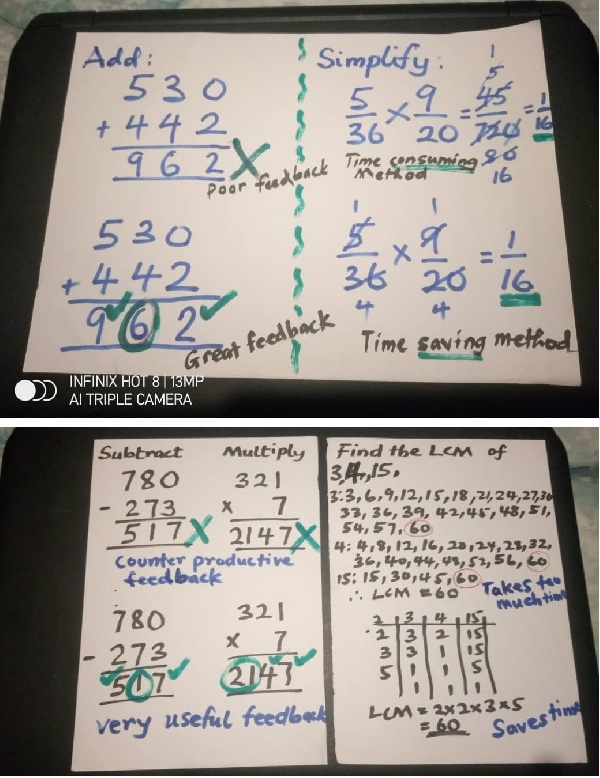THE ROLE OF PARENTS, GUARDIANS AND CHILDREN
‘It runs in the family, maths is a buggy subject for us.’ ‘Maths is very difficult.’ ‘She doesn’t do well in maths.’ ‘He doesn’t like maths.’ ‘She says, when the teacher teaches she doesn’t understand.’
As true as these statements may be, don’t make them in the presence of your ward. The signal it sends to him/her i.e your ward is ‘I have a challenge daddy and mummy knows, so everything is cool.’
This certainly isn’t the way to get them out of the quagmire. You must encourage and push them to change the narrative, which they very well can, with the right mindset and consistent effort.
The first statement to be thrown overboard is ‘I can’t do it’. Quite often it is mere fear of the unknown and sometimes outright laziness that makes your ward utter such a statement. Don’t accept s/he must try however hard it is. So the statement you should push for at all times is ‘I’ll try.’
The second statement that should be intolerable as far as you are trying to help is ‘I don’t understand anything /everything.’ Yes, there are times in learning as it is with everything worth acquiring, when things get so confusing and tough, that notwithstanding they aren’t supposed to give up.
They normally use that as an excuse when they dodge or do not complete work. Don’t have any of it! For if you do, your ward would not see the need to pay attention in class, attend lessons, or ask questions for the facilitator or mate to explain when they are stuck. Math being as cumulative as it is, the challenge becomes bigger the longer it festers.
So my question to pupils/students all levels from Basic school to institutions of higher learning, who is comfortable with, ‘I don’t understand’ statement and uses it as a cover all the time, is. If you are in B7/8/9 and whenever you are given some assignment, yours is to say ‘I don’t understand’ what makes you stand out from a Kg or B1/2/3 pupil who is brought/elevated to B7/8/9 and also makes that same statement.
*You either get what you want or the excuse for not having it.
*You’ve got to do what you’ve got do. Math is core to your progression in the educational ladder, ‘I don’t like math’, ‘I hate math’, ‘I fear math’, ‘Math is boring to me.’
‘Who at all brought math as a subject?’ Well! For you information math is a natural subject, all we done around as is more mathematical than anything else. Maybe as far as you are concerned it is an ‘evil’, then take it as a necessary evil and deal with it, face it squarely and you will be fine, I can assure you.
*Learning math must be done the right way. Unlike most other subjects, which require just reading, math has to be worked/solved. So if you keep reading math, you would find yourself wanting, when you are called upon to demonstrate what you have learnt.
So as parents and guardians we have a sacred responsibility to psyche up our wards/children to eschew negativity towards mathematics and approach it with positivity whatever the challenge they encounter with it.
It is not only about math as a subject to pass in exams, even more important is the lesson of grit that they acquire by trying to overcome the challenge they face in dealing with it.
Let them know that under or current educational circumstance they have to endear themselves to math, so it doesn’t become a hindrance to their forward march.
THE ROLE OF EDUCATORS
Conducive environment for learning: An environment which is not hostile, one that is empathic and not one that is lax either. Any extreme distorts the balance needed to make the environment conducive for learning maths.
There should be a zero tolerance for teasing by anybody in your classroom. Then again no punishment for lack of understanding or mistakes made during exercise or assignment.
GREAT TEACHERS EMPATHIZE WITH CHILDREN, RESPECT THEM, AND BELIEVE THAT EACH ONE HAS SOMETHING SPECIAL THAT CAN BE BUILT UPON. Ann Lieberman
The classroom must be the place where the pupils/students are ready and willing to make mistakes in order to get corrected. If as a facilitator you have not created such an environment, you have lost the plot.
Make it simple, lovable and enjoyable: Take them through step by step. USE PLAYING OF GAMES [as much as possible] THEY ARE EXCITED BY COMPETITIONS, CHALLENGES, etc you must make ground rules to engender healthy celebrations and jubilations. Gracious in victory and composure in defeat.
Motivate, inspire and encourage them: Stating how easy it is, getting them to do it, applauding efforts highly and above all linking what they are doing in class to their real everyday life.
Facilitate that’s all: You should not be at the centre of proceedings in the math class. The more they do the more they understand. You should also not be stuck with your favourite or convenient methods, let your pupils/students explore if they wish.
Portraying perfection/infallibility on your part, is not the way to go - acknowledge mistakes while solving, confusion, ask for help from the it doesn’t reduce your status.
The children will note that it is normal to get confused sometimes when working or make mistakes and therefore understand the need to take in their stride in such situations.
Occasionally solve questions to demonstrate to them or explain things but for the most part they must be engaged in demonstrating their understanding while you do the job of smoothing the rough edges that are identified. The process where teachers/tutors enjoy solving on the board sweating and toiling, finishing chalks and markers and filling the boards while that students/pupils who must be at centre of affairs, just copy, lazy about, loiter around, converse with mates and/or play. This has further exacerbated the lack of understanding and interest in an otherwise very interesting subject.
Indeed the most interesting subject in the world, one which we are all naturally included to on daily basis both the literates and the illiterates.
Use methods that cut out cheating during exercises: Let them demonstrate on the board their comprehension of a topic treated. Let them solve in their books while you move around the class to check.
Feedback: Give instant feedback that urges them on. Hap on ‘the killer mistakes’, which you notice them make – so they don’t repeat them.
Marking: The way and manner marking of math is done in the lower level, where the procedure is taken in consideration but just the correct answer leave much to be desire. Marking steps and procedure should start early in other for children to pick specific feedback, targeted at where there was a mix up in their work.
Time management: Draw their attention to time consuming methods, that, they must avoid using during examinations.

Copying: There are those who would make it a point to do all exercises, however, just by copying from others, either colluding or even stealing the books of others. Others steal glances when you are around. Explain to them the effect of cheating on the development of their mental capacity.
Laziness: There are those who won’t even do it at all in the first place, math can’t be mastered without practice. Know those who dodge work and make sure you check their work first or at least check their work before you leave the class.
Lack of focus: This lack of focus can even affect their comprehension and also ability to sit through a tough assignment to its logical conclusion.
Lack of comprehension of mathematical jargons: Pupils/students struggle a lot with word problems so much so, I’m of the view that real problem is understanding the language, even before writing out the numbers and calculating thereof.
Someone who chances on this piece may say, the proposal above is utopian, far from it, commitment to bettering the situation of math education in Ghana in particular and the world at large. How are other countries excelling in math education? This calls for painstakingly pragmatic steps to get us out of the mathematical doldrums.
So help us God!
Rayhann Shaban
Parent–Child Relationship Coach
Lead Education
Advocate Development Networks [ADN]
rayhannshaban@hotmail.com
0243414669/0200225235
Opinions of Wednesday, 27 March 2024
Columnist: Rayhann Shaban















